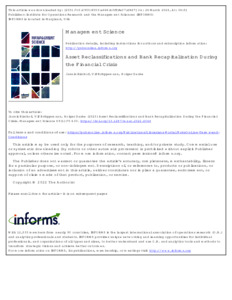|
Asset reclassifications and bank recapitalization during the financial crisis
Bischof, Jannis
;
Brüggemann, Ulf
;
Daske, Holger
![[img]](https://madoc.bib.uni-mannheim.de/62136/1.hassmallThumbnailVersion/bischof-et-al-2022-asset-reclassifications-and-bank-recapitalization-during-the-financial-crisis.pdf)  Vorschau |
|
PDF
bischof-et-al-2022-asset-reclassifications-and-bank-recapitalization-during-the-financial-crisis.pdf
- Veröffentlichte Version
Download (920kB)
|
|
DOI:
|
https://doi.org/10.1287/mnsc.2022.4364
|
|
URL:
|
https://pubsonline.informs.org/doi/10.1287/mnsc.20...
|
|
URN:
|
urn:nbn:de:bsz:180-madoc-621363
|
|
Dokumenttyp:
|
Zeitschriftenartikel
|
|
Erscheinungsjahr:
|
2023
|
|
Titel einer Zeitschrift oder einer Reihe:
|
Management Science
|
|
Band/Volume:
|
69
|
|
Heft/Issue:
|
1
|
|
Seitenbereich:
|
75-100
|
|
Ort der Veröffentlichung:
|
Cantonsville, MD
|
|
Verlag:
|
INFORMS
|
|
ISSN:
|
0025-1909 , 1526-5501
|
|
Sprache der Veröffentlichung:
|
Englisch
|
|
Einrichtung:
|
Fakultät für Betriebswirtschaftslehre > ABWL u. Unternehmensrechnung (Bischof 2015-)
Fakultät für Betriebswirtschaftslehre > ABWL, Unternehmensrechnung u. Empirische Kapitalmarktforschung (Daske 2007-)
|
|
Bereits vorhandene Lizenz:
|
 Creative Commons Namensnennung, nicht kommerziell, Weitergabe unter gleichen Bedingungen 4.0 International (CC BY-NC-SA 4.0) Creative Commons Namensnennung, nicht kommerziell, Weitergabe unter gleichen Bedingungen 4.0 International (CC BY-NC-SA 4.0)
|
|
Fachgebiet:
|
330 Wirtschaft
|
|
Freie Schlagwörter (Englisch):
|
bank regulation , financial crisis , fair value accounting , IFRS , regulatory capital , recapitalization
|
|
Abstract:
|
Regulators frequently relax accounting rules during afinancial crisis as a meansof regulatory forbearance. The new accounting options provide banks with an opportunityfor an accrual-based increase in their regulatory capital. The use of such an accountingoption helps reduce the costs of government interventions such as bailouts and avoidthe dilution of existing shareholders’ownership rights. We examine the introduction of thereclassification option forfinancial assets during the 2008financial crisis and study the posi-tion of accrual-based options in the pecking order of banks’recapitalization measures. Thefindings suggest that the accrual-based increase in regulatory capital is temporary and doesnot provide permanent relief. Consistent with the long-term costs of accrual-based measures, investors perceive the accounting choice as a negative signal. If banks do not complement their use of the accounting option by other corrective actions that result in a real capitalincrease and a liquidity injection, they continue to suffer from low capitalization andfinancial difficulties in the following years. Ultimately, government interventions in accountingregulation are unlikely to offer a sustainable solution to capital shortfalls in the banking sector if they are not supported by the concurrent enforcement of real corrective actions.
|
 
 | Dieser Eintrag ist Teil der Universitätsbibliographie. |
 | Das Dokument wird vom Publikationsserver der Universitätsbibliothek Mannheim bereitgestellt. |
 Suche Autoren in Suche Autoren in
Sie haben einen Fehler gefunden? Teilen Sie uns Ihren Korrekturwunsch bitte hier mit: E-Mail
Actions (login required)
 |
Eintrag anzeigen |
|
|
 ORCID: 0000-0001-6153-5269
ORCID: 0000-0001-6153-5269



 Creative Commons Namensnennung, nicht kommerziell, Weitergabe unter gleichen Bedingungen 4.0 International (CC BY-NC-SA 4.0)
Creative Commons Namensnennung, nicht kommerziell, Weitergabe unter gleichen Bedingungen 4.0 International (CC BY-NC-SA 4.0)

 Suche Autoren in
Suche Autoren in